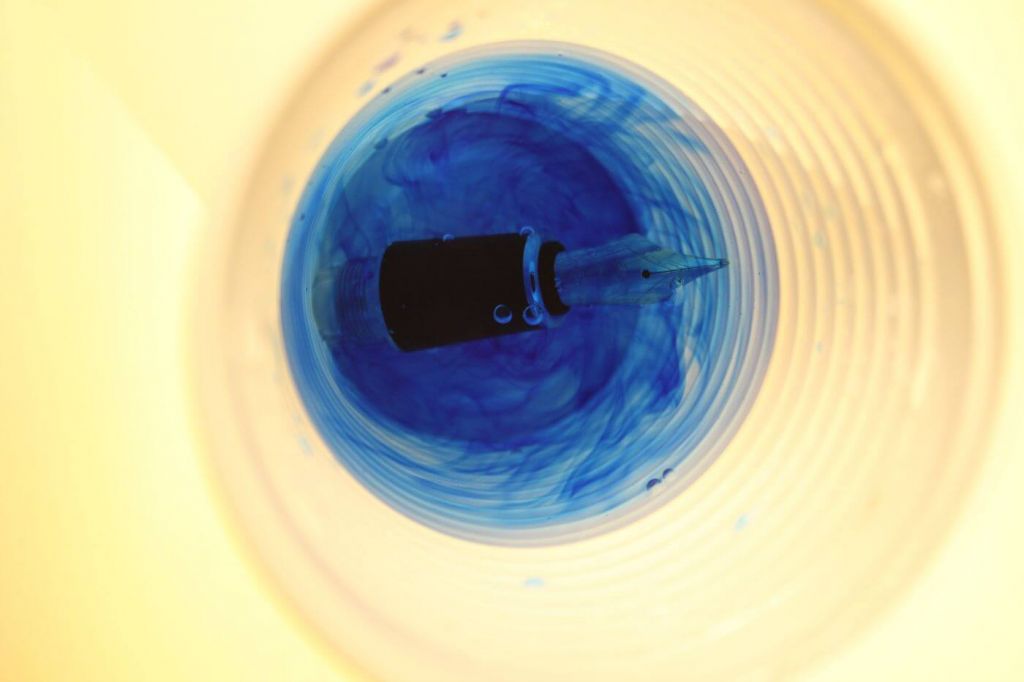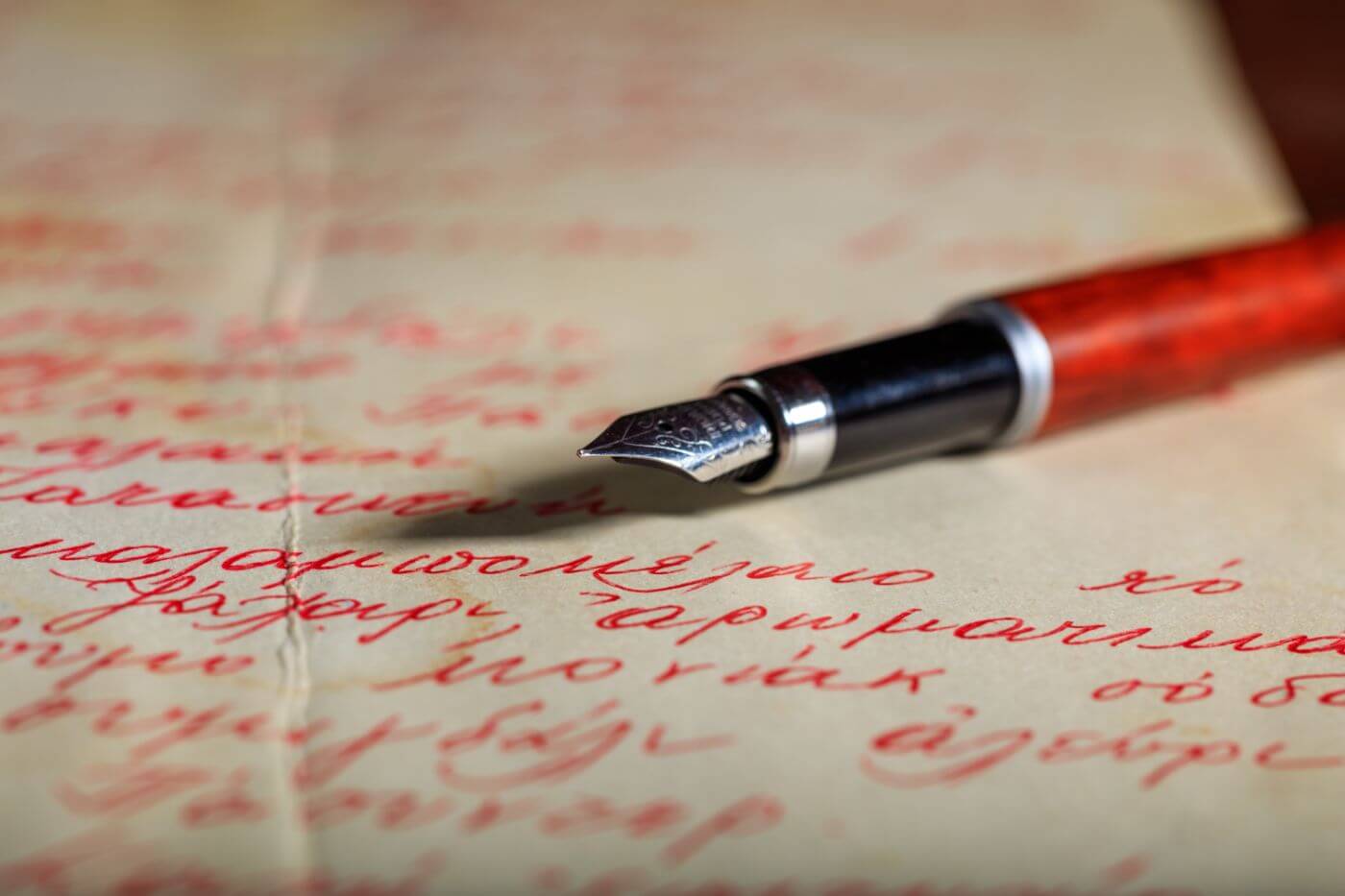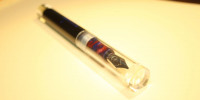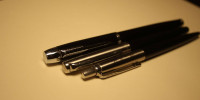How Often to Clean a Fountain Pen? (Less Than You Think)

When I first started using fountain pens, I didn't know you have to clean them, and it took about four years to clean my fountain pen for the first time. That explains why it didn't work properly.
How often to clean a fountain pen? Generally, fountain pens need to be cleaned at least once a month, especially with continuous use. It is also recommended to clean your pens in between refills, even when using the same ink again. It will prevent the feed from clogging up due to a build up of dry pigments.
How often you need to clean your pen really depends on how you use it. Read on to learn more.
In this article:
How Often to Clean Your Pen
- Once a week: vintage pens, pens that dry out often, thick inks, glitter inks
- Once a month: most pens if you want to keep them writing smoothly
- Once a quarter: all pens that are inked up, regardless of use, ink, or type
- Between refills: when changing ink (although a quick flush is recommended)
Most pen enthusiasts seem to clean their pens anywhere from once every week to once every month. Personally, I flush my pens about once per month. I also flush between ink refills. You don't have to do this if you use the same ink, although it is recommended. It will help with ink flow, but it will also prevent your ink from getting contaminated.
Of course, it depends on how you use your pen. But these are some best practices everybody seems to agree on. The rest is purely personal preference.
Some good rules of thumb:
- Clean your pen at least each quarter if you don't experience problems
- Most pen enthusiasts seem to clean their pens once per month
- Clean between refills, especially if you're changing inks
- Clean it more often if you experience problems like skipping or dry start
- Clean it more often if you use inks with special properties, like glitter
Some pens require less cleaning, and it really depends on how well the pen is performing. If a pen doesn't dry out and you don't use it very often, you can keep the ink in there for multiple years without cleaning.
I've heard multiple people talk about Platinum's Slip and Seal mechanism (which is on their more expensive 3776 Century, but also the cheap Preppy). It keeps your nib and feed wet for multiple years.
Pens that dry out quickly need to be cleaned frequently, regardless of whether you use them or not. I find that I stop inking up dry pens after a while (like my Parker IM), since they require too much maintenance to my liking — there are so many (cheap) pens out there that will stay perfectly wet without trouble.
However, pens you use a lot should be cleaned frequently. Pens collect paper particles and other dirt while writing, and leaving that to build up inside the feed will cause problems in the long run.

When to Clean your Fountain Pen More Often
For some pens and inks, you might want to clean them out every one or two weeks or so. Here's when I would clean my pen more often:
- Vintage pens
- Thick inks with lots of pigments or other particles like glitter
- Demonstrator fountain pens you want to keep looking clean
- Pens you don't use often
Cleaning prevents problems down the line. Keeping your feed, nib, and ink reservoir clean will prevent any build-up and make sure you won't have to bring out the big guns later on.
This is especially important with special pens that might be more fragile, like vintage pens. A good rule of thumb is: keep clean what you don't want to hose down later on. The problem with build-up is that it gets increasingly more difficult to remove, while it was still very easy in the beginning.
I used to have a small electric oven that I had to throw out because of this rookie mistake. I let the sud build-up and rebake up until a point it became impossible to remove, and the entire oven started smoking every time I was baking a pizza. Ah, the good old student days. Lesson learned. I have a new oven now, and I intend to keep it clean.
It's the same with fountain pens. Build-up, under build-up, under build-up is difficult to soak clean with just water. Which means you'll have to bring out something more aggressive, like an ammonia solution. That's fine in most cases, except with vintage pens, which could partly dissolve if you're unlucky. So why wait until you need to take that chance when you can simply clean it with some water once a month?
Pens you don't use a lot will tend to dry up more quickly. Letting that pen dry out over and over again will make the build-up harder to remove over time. Inks that tend to clog your feed or stain your nice clear demonstrator also require regular flushing, if you want to keep them clear and clean.
What Happens If you Don't Clean your Pen?
If you don't clean your pen, two things will happen to it:
- the feed will clog
- there will be build-up on the nib
Even if you only use your pen in a medical lab or something like that, those two things will still be the case. Your feed clogs up with all kinds of stuff. Ink pigment build-up, paper particles, dust, metal shavings, you name it, it all gets in there. The best remedy against those things is keeping the feed clean, wet, and flowing. The nib will have similar build-up, and so will the grip section. This all will lead to a series of unfortunate events:
- your pen will start skipping
- it won't start straight away, only after priming
- your nib will feel scratchy
- the entire writing experience will become unpleasant
- you will curse fountain pens in general
- you will contaminate your ink bottles
- which will cause your ink to go bad
- bacteria will grow and form slime and mold inside your ink
- you will open a bottle and be like:

If you're experiencing any of these problems, you most likely have a clogged up feed. If you want to learn how to prevent that in the future, read my article with 11 hacks to prevent your pens from drying out. Some are as easy as storing them in a different location.
How Cleaning Your Pen Helps You
In contrast, flushing out your pen every couple of weeks or so will prevent that build-up from settling in. Keeping your feed and nib clean will help you have the best writing experience out there:
- the feed will stay clean
- the nib will remain clean
- you will have good ink flow
- the nib will feel smooth
- the writing experience will be pleasant
- you will love fountain pens
- your ink will last years or even decades
You will be like:

How to Limit the Amount of Work
If you have multiple pens, keep some pens out of the rotation. I currently have eight pens inked up: even that is more than I'll be able to use this week. In practice, I keep using the same four pens over and over again. Keeping some out of rotation will save you the maintenance and trouble. Clean them out real good before storing, that way you won't have to clean them as long as you don't use them.
Always flush your pens between refills, it will keep the amount of clogging to a minimum, reducing work in the future. Just a simple rinse under the tap and sucking up water through the nib using the converter a couple of times does the trick for me.
Don't use any special products, apart from very simple pen flush, to clean out your pens; it will probably make things worse. I only use my cheap homemade pen flush if it is necessary. I consider it necessary when I continue to flush out ink, even after an overnight soak.
Use pen-friendly inks, avoid special inks or inks that are known to cause problems.
Inks that I know are fountain pen-friendly:
- Waterman basic colors
- Diamine basic colors
- Parker and Sheaffer basic colors
- Pelikan Edelstein
- Pilot Iroshizuku
... and many more, but those are the ones I've seen over and over again and have personal experience with. Generally, most basic colors of premium brand are very fountain pen friendly.
My recommended cleaning products for fountain pen
- Complete pen cleaning kit by Koh-I-Noor (check price on Amazon). It comes with their famous pen flush and a good bulb syringe.
- On a budget, I recommend universal bulb syringes (check price on Amazon) - for flushing out pens quickly. Simply cut off the nozzle to fit your pen sections.
- Koh-I-Noor Rapido Eze Pen Cleaner (check on Amazon) - the most well-known pen cleaner for hard to clean ink stains.
If you appreciate good tools and supplies, you can check out my other pen maintenance product recommendations here.
Did you find the answer to your specific question?
👍 4 👎 3



Leave a comment